Umberto and the Duke
(fiction)
For those of you who prefer to read off paper rather than the screen, I have converted this entry into an easily printable pdf file:
Umberto’s property encompassed three hills in the southern province of Varpathia. Each hill was green and grassy, sparkling like emeralds in the dusty plains of the region. Umberto’s hills were embraced by the cold waters of the River Strito that rushed from the snow-capped mountains into the brown land. The hills greedily sucked the Strito’s cool water, turning the soil dark and loamy. The grass on the hills grew straight and thick and it rippled in the hot summer winds like thousands of tiny waves. In fact, the grass grew so fast and so thick that Umberto kept nearly one hundred white-haired goats on the hills, and they never went hungry. On any given day, a traveller could stop on the road where it crested the first ascent of the Northern Mountains and look back to see Umberto’s three green hills crawling with fat, creamy goats. Sometimes the goats massed together in clumps, and it looked as if the snow of the mountains had drifted down to rest on Umberto’s hills. Umberto did not make much money from his goats, but he lived happily in the millstone house his father had built at the top of the smallest hill.
Umberto was occasionally visited by a Learned Man from the nearby village. The Learned Man would bring a book with him and Umberto would practice reading. Then, after an hour or so, Umberto and the Learned Man would eat together and Umberto would send the Learned Man away with a jar of milk or wheel of cheese as payment. Umberto was not a fast reader, but he appreciated the Learned Man’s efforts to teach him. For his part, the Learned Man enjoyed keeping the company of a man like Umberto. Though he told his friends that he found simple pleasure in this act of civic service, the truth was that the Learned Man enjoyed situations where he felt assured of his superior intellect. Thus, the Learned Man generally approached Umberto’s little house on top of the hill in high spirits.
One day, however, the Learned Man came to Umberto’s front door with a dejected look and a heaviness in his shoulders.
“What is wrong, my friend?” Umberto asked as he took the Learned Man’s coat. “What troubles you?”
The Learned Man smoothed the silk scarf which hung from his neck and sat down in Umberto’s rocking chair. “It is the glomatees,” the Learned Man sighed. “The whole village is infected and the children are dying.”
Umberto pulled up a hard wooden chair and furrowed his brow. “I have heard of the glomatees, but I do not know what they are.”
The Learned Man began rubbing his hands as if he were cold, even though the afternoon had been hot and dry. “The glomatees are a type of fly, which come from the province of Bathismulle,” he explained. “They lay their eggs in children’s eyebrows, and their maggots burrow into the childrens’ eyes until they are blind. Many grow sick and die.”
“Is there any cure?”
The Learned Man shook his head. “None that I know of. My friends tell me they have consulted all the authoritative texts, but have found nothing.”
Umberto shook his head sadly and made the sign of the royal star with his fingers.
The Learned Man shifted back in Umberto’s rocking chair and looked at him shrewdly. “It’s no good invoking the Duke’s protection. If he could help, he would have done it by now surely. But the children continue to die, so he must not be able to.”
Umberto looked at him quizzically, but did not speak.
“That is, of course, if he did not invent the glomatees in the first place,” the Learned Man said airily as he looked out the window. “I know there are some that say the Duke fashioned the entire country and the creatures within it. So perhaps these horrible creatures are some kind of punishment he is conjuring.”
Umberto’s brow was deeply furrowed. “My friend,” he muttered, “you should not be saying such things.”
The Learned Man barked a laugh. “Tell me Umberto, have you ever seen the Duke?”
Umberto remained frowning and said nothing.
“Have you ever been to the Golden Duchy? Walked through the Forest of Sun Trees? Seen the Ever-Spinning Winds of the Red Valley? Of course not.” The Learned Man smiled good-naturedly. “Nobody has, at least nobody I have ever met.”
“But is that not because only the Uplifted — ” Umberto began.
“Yes,” the Learned Man scowled. “Only the Uplifted can venture to such places. I know the rhetoric.” The shrewd look came back into his eyes. “But even if the Duke and his lands are real, then do you really believe that he created the whole country? Even dirty, dusty Varpathia?”
Umberto leaned back in his chair. “Well, yes. I have always believed that.”
The Learned Man smiled and shook his head derisively. “Then of course there is the obvious question, the unavoidable question: How can the Duke truly be the champion of good as the Believers claim, if he created a land with so much evil in it?” The Learned Man raised his eyebrows and stared at Umberto.
Umberto sat quietly for several moments, before getting up and walking to the kitchen. “I must start making dinner,” he said simply.
“May I stay?” the Learned Man asked. “I have not brought a book, but a hot meal would be most welcome.”
Umberto nodded, but a sinking feeling was sucking away at his stomach.
The Learned Man did not leave the rocking chair while Umberto bustled around the kitchen, and all was silent for a time.
“Of course,” the Learned Man said, talking with his back turned to Umberto, “the other option is that the Duke does not have full control of this country. That he is impotent in some way.”
Umberto stopped what he was doing. “I do not know what that word means,” he said tentatively, looking over with a mixture of fear and resignation.
“It means to be powerless,” the Learned Man said as he stood up and strode over to where Umberto stood by the stove. “So perhaps the Duke is not evil per se, but he is just not as powerful as the Believers say.”
Umberto shrugged, but looked down. “You have seen the miracles as well as I.”
“Yes I have seen the miracles!” the Learned Man snapped. “But still our fields are dusty and now the children are dying. And the Duke does nothing.” The Learned Man composed himself. “Do tell me, dear Umberto, why would someone as good as the Duke not intervene?”
Umberto shook his head and gazed blankly at the stew on the stove top. “I do not know. But he is not powerless, I am sure of it.”
“There is one more option,” the Learned Man said, the shrewd look back in his eye for a third time. “Perhaps there is no Duke. Perhaps all the miracles are of some other power.”
Umberto tensed. “What are you talking about?”
The Learned Man pursed his lips. “You know exactly what I mean. If the Duke is not evil and he is not impotent, then he must simply not exist. There must be other powers at work.”
“I hope I am not misunderstanding you,” Umberto said, spooning the hot stew into two bowls. “But if you are talking about the Force of Impersonal Nature, then we shall talk no more.”
“Yes, yes! The Force of Impersonal Nature! Exactly.” The Learned Man took the two bowls over to the small wooden table. “What else could it be? You insist the Duke is not evil and not impotent, so then something else must make this rotten world work the way it does!”
Umberto sat down at the table and thought, harder than he ever had. His mind spun and clicked, like the gears and shafts of a grist mill crushing grain against stone. “I understand what you are saying,” Umberto said respectfully and slowly, waiting for the words to form in the back of his throat. There was something in his mind, if he could just articulate it. “But is there not a fourth option? That the Duke is good and is powerful and does exist, but that he knows far more than we do about how the world should work? I have heard the Believers speak of the Duke’s infinite wisdom, and they say that even death is not the same to Him as it is to us.”
The Learned Man chuckled and shook his head. “That rings hollow in my ears, Umberto. But please, let us stop our chatter and eat this delicious stew.”
They both began eating. The stew was too hot for Umberto, so he blew on his spoon and took small bites, but the Learned Man was shovelling it into his mouth, swallowing steaming chunks of meat whole.
“Ah, that warms my insides,” the Learned Man said between mouthfuls, the shrewd look gone and replaced with something like triumph.
Umberto was still stuck in deep thought, and as he finally arrived at some sort of conclusion he set down his spoon .
“How do you know what is evil and what is good?” he asked.
“What?” the Learned Man said sharply, looking up from his half-empty bowl.
“If there is no Duke and instead the world is controlled by the Force of Impersonal Nature, then how do you know what is evil and good? How can evil and good even exist?”
The Learned Man hesitated then forced a smile. “It is very difficult to answer such a question, my friend. But please do not trouble yourself too much. I should not have raised this topic with you.”
The Learned Man leaned back in his chair in a show of indifference and airiness, but as he did the toe of his boot caught one leg of the table, and by some trick of the angle the table leg twisted and pulled away and the table collapsed, tipping the Learned Man’s bowl onto the floor and shooting Umberto’s bowl high into the air before it shattered against the stone wall. Umberto jumped to his feet to help the Learned Man who was pinned under the broken table.
“I am unhurt,” the Learned Man assured Umberto. “But I must repay you for the damage to your table and the bowl.” The Learned Man stooped and began picking up the shards from the floor. “I think I should leave and try to find some craftsman in the village.”
Umberto was kneeling over the table to inspect the joint where the broken leg had separated. “I cannot say how this happened,” he muttered, before looking up at the Learned Man. “But do not be concerned. There is no rush, and besides, I am enjoying our conversation. We can still sit and talk.”
The Learned Man paused and looked down at Umberto. Then he nodded and removed his silk scarf so he could help Umberto clean up the mess.
After everything was tidy and Umberto had cleaned the floor with a wet rag, the Learned Man and Umberto took two chairs out the front of Umberto’s little stone house so they could watch the sunset over the western salt flats. Umberto kindled a fire in the hollow next to the well and hung a full kettle to boil.
“So,” Umberto said, leaning back in his chair and stretching out his legs. “Could you explain to me again how good and evil can exist if the Duke does not?” Umberto felt strangely serene, like he was floating through the evening sky.
The Learned Man’s shoulders stiffened as he stroked his sharp, lean face. “Your question is wise, Umberto. It is one which Learned Men have struggled with for hundreds of years.” He paused and stared at the sinking sun.
“You say that the children being killed by the glomatees is an evil thing,” Umberto prompted.
“Well of course it is!” the Learned Man snapped. “Any fool can see that.”
“But,” Umberto continued calmly, hands folded neatly in his lap, “how can there be such things as good or evil in a world controlled by the Force of Impersonal Nature?”
The Learned Man continued to gaze at the horizon in silence and Umberto eventually rose from his chair to check on the boiling kettle. There were small bubbles forming around the edges of the black steel, but no large bubbles had broken the surface of the water. Umberto stoked the fire then meandered back to his seat. When the Learned Man finally turned to look at Umberto, his eyes were smoky with the embers of the dying sun.
“I do not know,” the Learned Man whispered hoarsely. “How can I know? I am just a man, Umberto. Yes I am learned, but I am still just a man.” He rubbed his hands together again, though the evening air was warm. “But how can there be a Duke?” he pleaded. “How?” Two small tears dropped from his eyes onto his knees. “The children are innocents and yet they suffer and die. What good Duke would want such a thing to happen in the country that he built?” The Learned Man looked up at Umberto with sorrow and anger.
Now it was Umberto’s turn to be silent and ponder. Many moments passed before Umberto could respond. “I’ve heard the Believers say that we are unable to know many things about the world.” Umberto’s face broke into a small smile. “I know that my mind is smaller than yours, my friend, but maybe no matter how much you learn, you will not ever truly understand it all.”
The Learned Man gave a small nod of agreement.
“I’m trying to imagine what I would do if I was the Duke,” Umberto said with deep concentration. “If I had fashioned this land and everything in it, but granted each citizen independence, what would I do? Would I intervene at every crisis?” Umberto tapped his knee, then broke off and swung the kettle off the stove for it was boiling over with hot, steaming water. He knew he was right on the edge of something that was big and unwieldy. His mind needed to wrap around it, like the pythons that slithered up from the eastern forests and swallowed his goats whole.
“And then there is the Golden Duchy, the Duke’s own settlement,” Umberto said slowly, “which is said to be a land of supreme beauty and peace. The Uplifted live there, some say forever.” He glanced up at the Learned Man and was surprised to see him gazing back with a soft look in his eyes.
Umberto continued with his thoughts. “So if I were the Duke and all this were true, maybe I would not see calling children to the Golden Duchy as an evil thing. Maybe it would be a gift. An escape from this sad province to a joyous kingdom.” Umberto carefully picked up the kettle and carried it inside to pour two cups of tea.
When he came back outside the Learned Man had not moved, his eyes still fixed on the orange disc of the sinking sun. He murmured his thanks as Umberto handed him a cup.
“I had a younger sister when I was growing up,” Umberto said once he had settled back in his chair. “She was born with a mind-sickness which grieved my mother very much. Her name was Listretta, but we always called her ‘Lista’. One day, when Lista was seven years old, my mother asked one of the Believers in the village, Brother Onstranto, to come to our house to heal Lista. But once he had met Lista he sat my mother down and told her that there was nothing he could do, because there was nothing wrong with her. Brother Onstranto said that instead of seeing Lista’s mind-sickness as a problem, the Duke would see Lista as more beautiful than any of us. Because of her sickness, she could never break his laws. She could never do wrong. She could only ever love and be loved.”
The Learned Man was sipping his tea gingerly, and the small tongues of steam licked up his face.
“Sometimes I have thought that the Believer was only saying this to comfort my mother and put her mind at peace. But I remember the warmth in his eyes, and I know he believed what he was saying. That Lista was beautiful to him and the Duke in a way that I could not see. That she was perfect in a way that I would never be.”
Umberto took a deep breath and then exhaled slowly.
“And maybe it is the same with the children who die from the glomatees. A short period of suffering followed by an eternity of happiness. The stories say that the Duke knows all about pain and suffering, they say it made him who he is.” Umberto too began drinking his tea, letting the bitter taste swill around his mouth.
The sun had completely disappeared now, in a final scarlet flash, and darkness was encroaching on the sky.
The Learned Man broke the silence. “You know, Umberto, my father was a Great Learned Man,” he said, looking beyond Umberto’s wide, brown eyes. “But it was my mother who I always admired. I remember her saying that the whole world had simply been a gift to us, but we had infected it with evil. She said that was the cost of independence, that people would use their independence to harm others and themselves.” The Learned Man trailed off and looked down at the tea in his hands.
They were both quiet then, listening to the bleating of the goats on the hills. They both drank their tea and watched as the stars slowly appeared in the moonless sky. The horizon was glowing bright pink, but the colour was fading with each passing second. Soon the entire bowl of the sky was dark purple, empty except for the glowing seeds of the stars — silver pinpricks of light that had been there the whole time, but which were only now becoming visible.




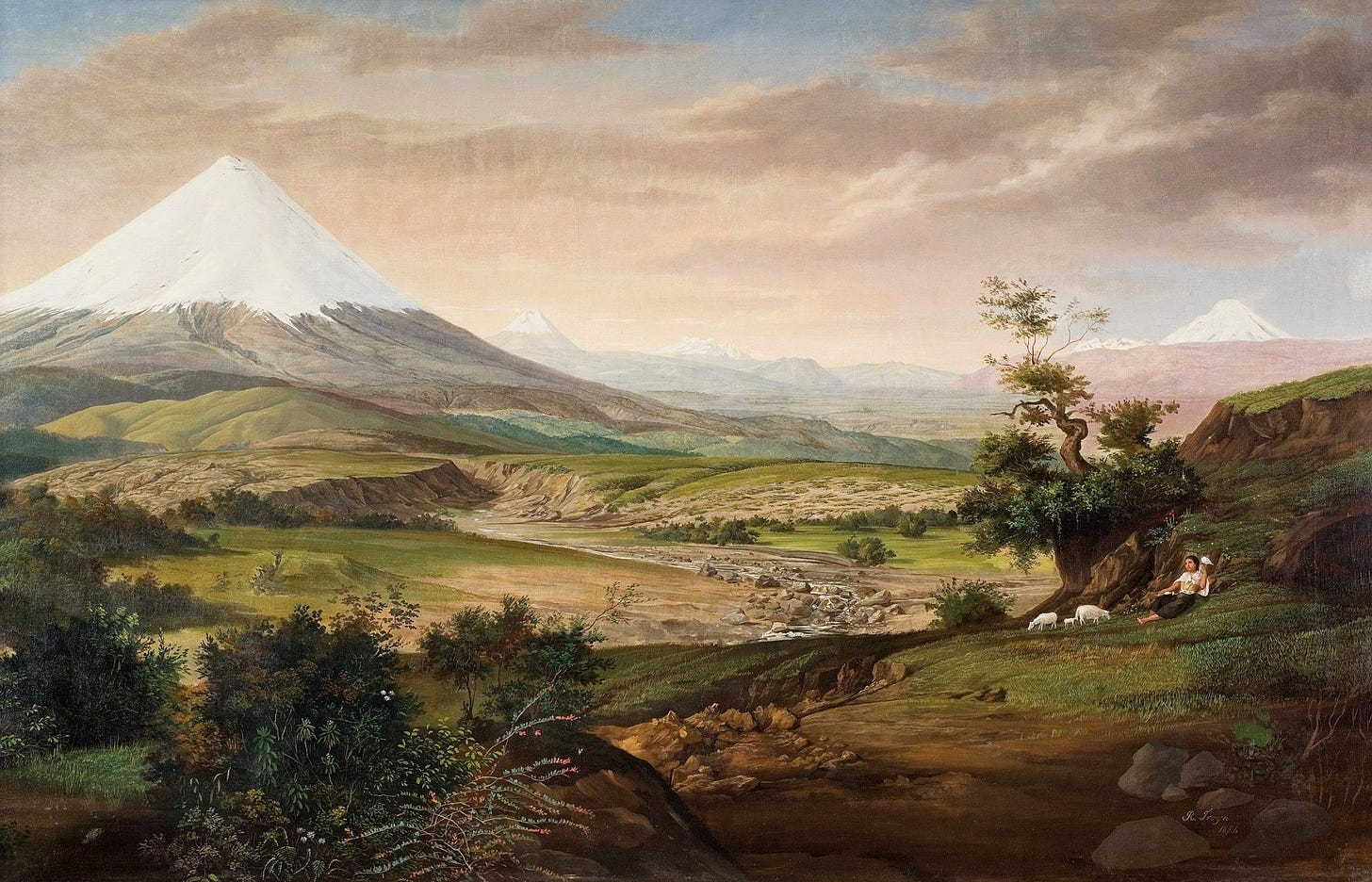
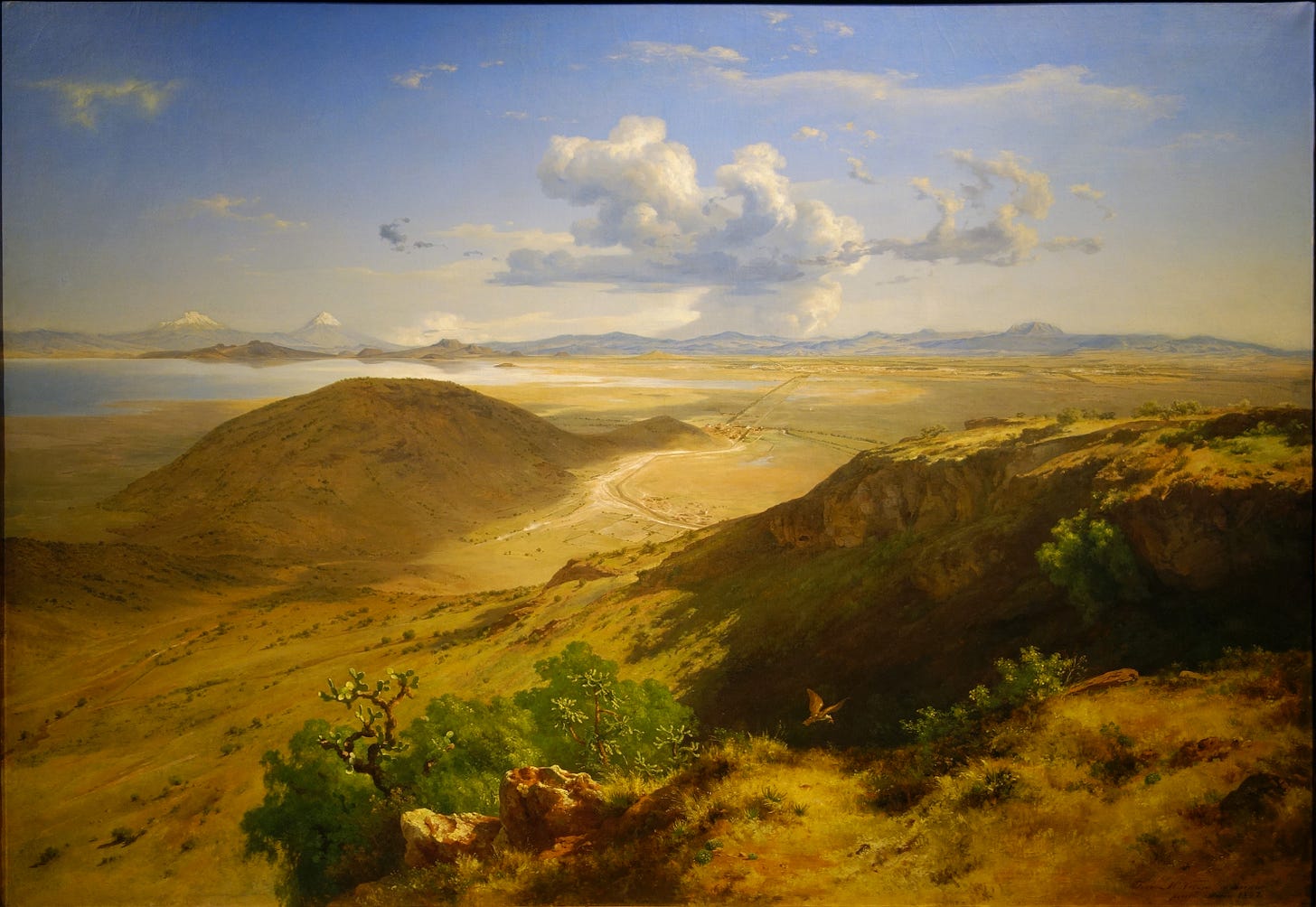
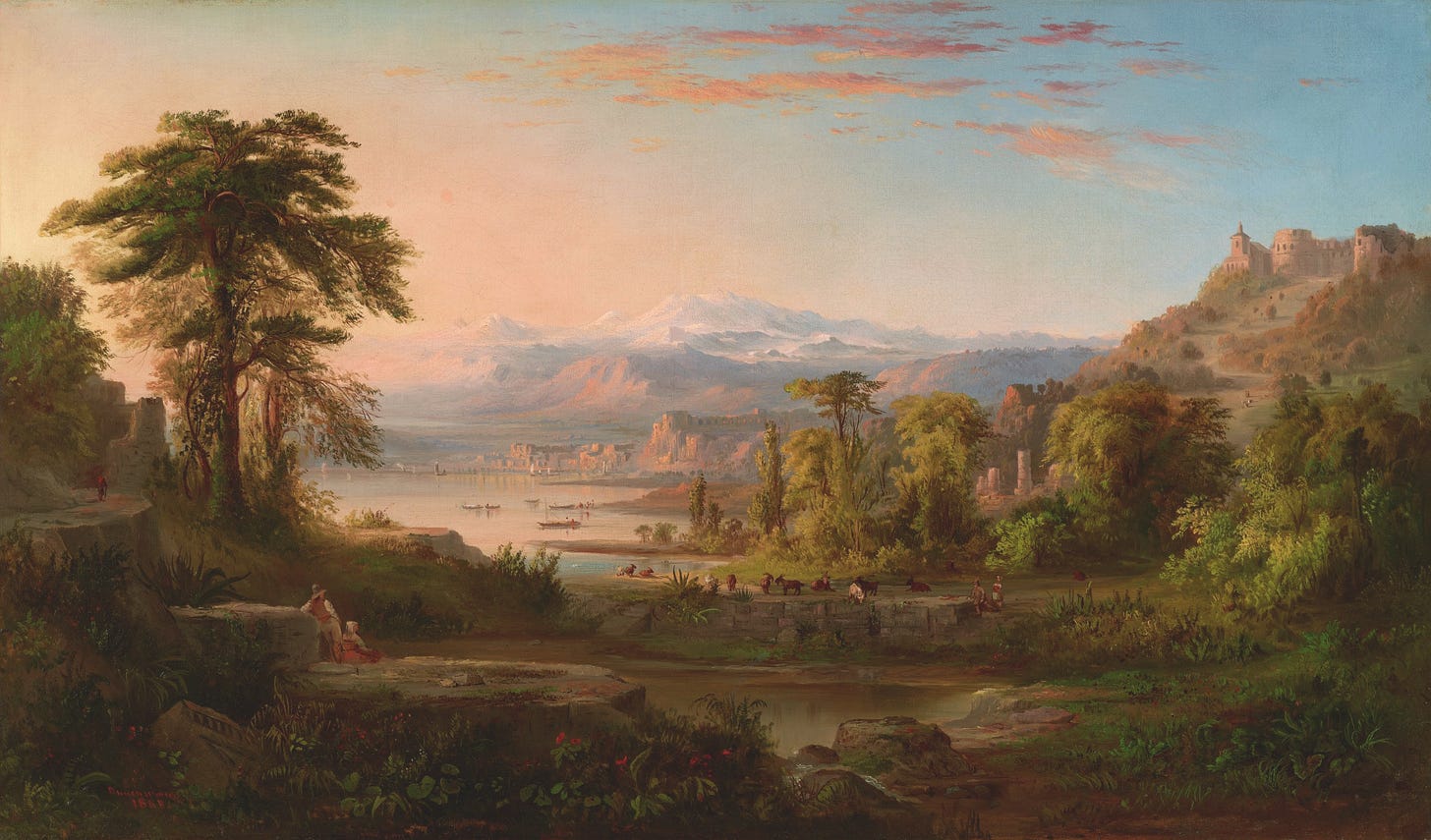
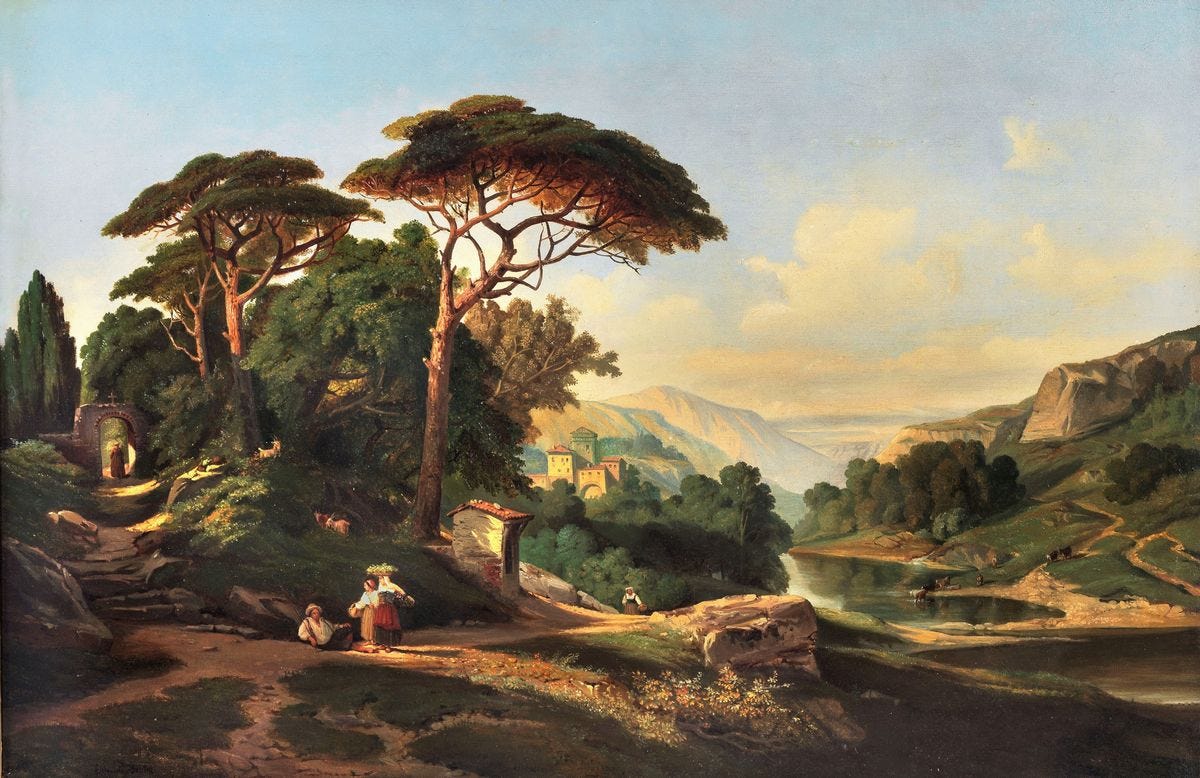
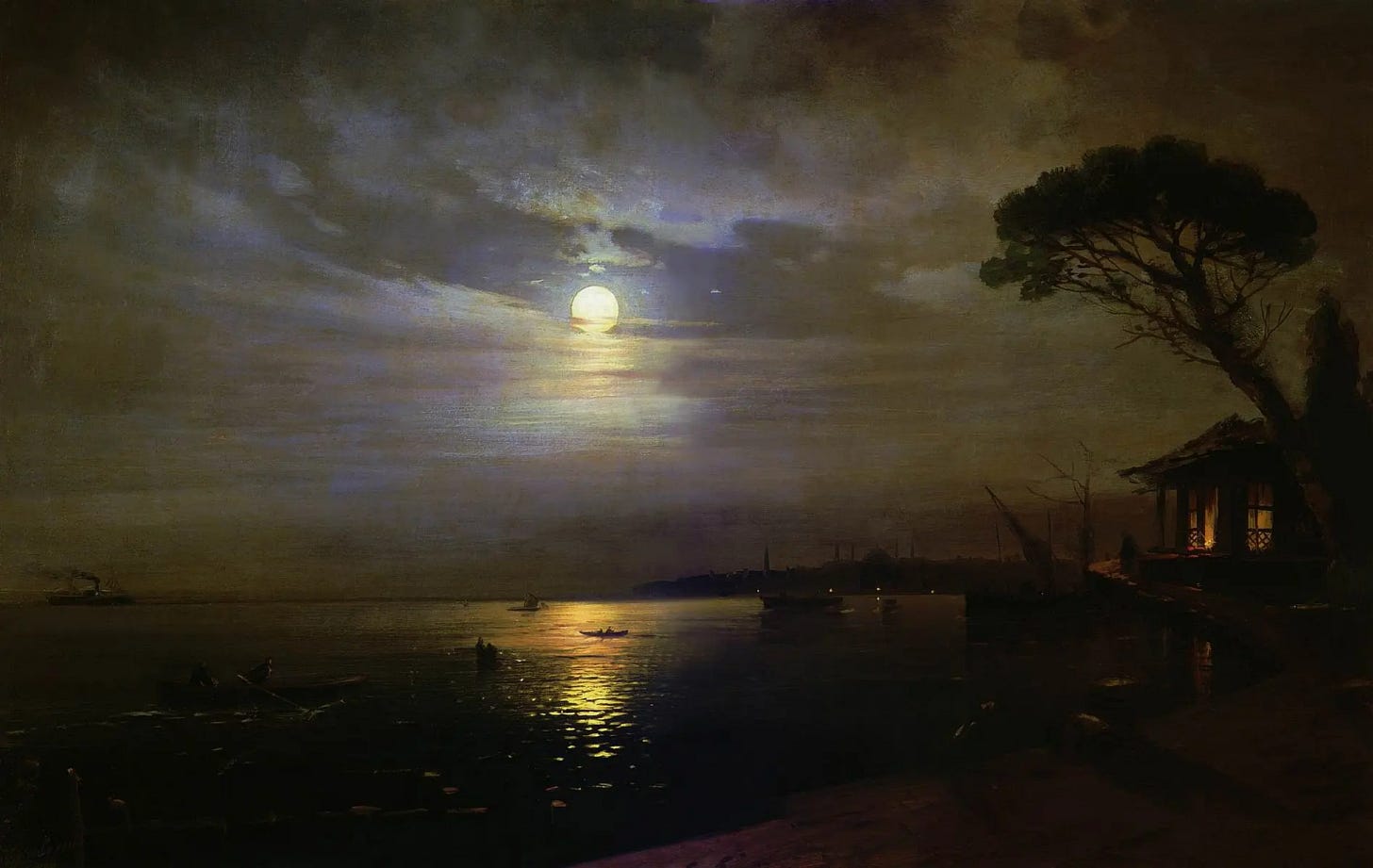

I loved everything about this story and I wish I could give it more than one like. I liked reading it slowly and catching on that there was more running underneath than what was being said on the surface—the further I read, the deeper it went and it continues deeper in my mind the more I think about it. It reads beautifully; thank you for writing it.
So this is a sweet, sweet story. And I don't mean sweet as in candy, but sweet as in both the current slang term (as in excellent) and in terms of gentleness. I read it twice and love the understory, the main point of their dialogue.
What I am about to say should be taken with the knowledge that I am not an avid reader of fantasy. Some I like. But most I do not. And I wondered whether you needed to create a fantasy world for this, whether it could just be an imaginary place in the real world. Because the nature of this story is literary; the fantasy part, i.e., this world they live in, seems superfluous and, if anything, distracting.
In any event, thank you for bringing it to my attention and I hope my comments are taken with the knowledge that I greatly appreciated how you wrote it.